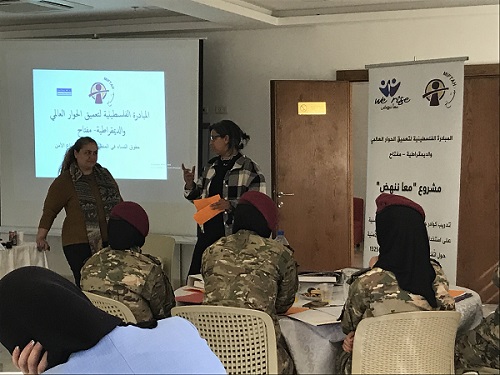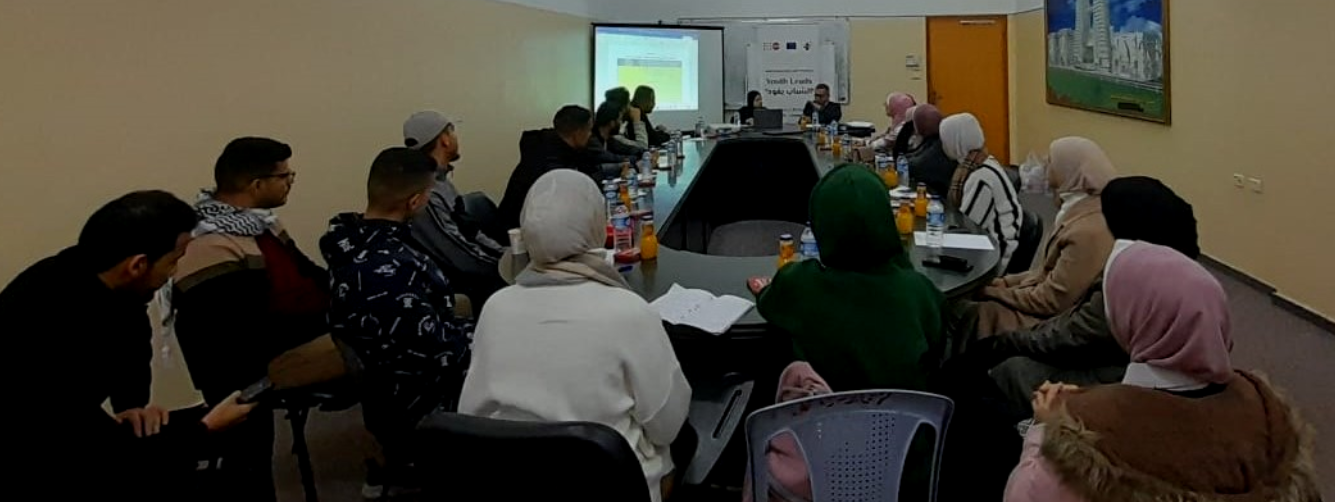
Ramallah – 9/3/22 – MIFTAH recently capped off three days of training on human rights conventions, including The Convention on the Elimination of All Forms of Discrimination against Women (CEDAW), as references, for Palestinian security services. The training was based on a MIFTAH manual aimed at elevating the performance of the Palestinian security sector and developing policies and measures for its work to respond to the reality of gender discrimination against Palestinian women and girls. The training targeted military, civilian and academic members of Al Istiqlal University, the Palestinian Academy for Security Sciences.
The training program included a presentation of gender-related concepts and their significance within the Palestinian context, as an analytical tool for the work of security services and at the level of organizational structures in military training academies, to guarantee equality, equity and non-discrimination based on sex, race or political affiliation. It also included a presentation on the development of women’s rights within international conventions, particularly CEDAW and UNSCR1325 and the extent to which they are applicable to the case of Palestinian women.
The three-day training constituted an interactive space to showcase the best practices for security services in dealing with survivors of domestic violence and who are at odds with the law, in addition to women working in the security sector and in public spaces. The discussion revolved around actual practices and the legal loopholes identified by the CEDAW committee and included in the State of Palestine’s comments. They also noted the importance of applying pressure on decision-makers to do everything necessary to guarantee that work proceeds according to the principle of the rule of law and the protection of women’s rights within the system of enacted laws, including the Penal Code and the Personal Status Law. In addition, the participants said it was necessary to expedite the ratification of the Family Protection Law.
Participant responses
Al Istiqlal University Vice President of Administrative and Financial Affairs, Dr. Raja Sweidan, said she hoped MIFTAH would continue to offer training in the future, to get an even closer look at CEDAW and Resolution 1325 and arrive at practical applications on how to integrate gender in university departments and the security academy. She also encouraged further discussion over observations on the manual in order to amend and develop it, in addition to presenting more cases from Al Istiqlal University and ways to develop them.
As to how CEDAW could be implemented within security and military academy policies, Dr. Sweidan said this could be achieved primarily through training. “We need training and capacity building of teams from security training academies on the specifics of CEDAW to coincide with Palestinian culture and society and to arrive at a deeper understanding of this convention through introduction to its provisions and articles. After the training, gender-sensitive systems and measures must be created and budgets earmarked for capacity-building. This is in addition to trainers introducing teams to awareness programs and then formulating clear policies at the university to commit to the integration of gender issues.”
In his assessment of the training and ways to implement CEDAW and UNSCR1325 in military training in particular and within the work of security services in general, Imad Younis, Vice President of Military Training at Al Istiqlal University said, “This training was a necessity so that we can better explore the specifics of CEDAW and Resolution 1325. Truth is, the stereotypes surrounding this Convention in particular, misconstrued the idea of liberties granted to women. However, the training clarified some concepts and terms.”
Younis said he believed it was necessary to continue this training with different teams within the security services and employees of Al Istiqlal University. “This is because we need answers to a lot of questions pertaining to UNSCR1325. We support this resolution because it advances our cause in international arenas and sheds light on violations against women, whether from the occupation or by society.”
In his assessment of the training and manual prepared by MIFTAH, Dr. Osama Darraj stated, “Everyone agreed the training was beneficial for us all. It gave us the opportunity to get a closer look at Resolution 1325 and CEDAW. We will not hesitate in the future to take part in similar trainings.”
Darraj also recommended that they needed tools to carry out the training so “we trainees can train our students on what we learned and be able to pass on this experience to them.”
In regards to using CEDAW and Resolution 1325 as a reference for security services in general and in Al Istiqlal University in particular, Dr. Kifah Manasra stressed on the importance of convincing decision-makers within the security establishment and at the university on this. “We do not need to create special units within the security establishment and the university to implement this convention, but rather to internalize and integrate CEDAW into the work of all units and bodies within these institutions so they are more gender-sensitive. This can be accomplished through training all members, which should be a condition for enrollment. This way, these institutions will become resistant to discrimination and capable of creating a safe environment pertaining to violence-related issues, in general. We need to establish assessment, follow-up and monitoring units for all violations because this would allow for the creation of shared concepts at the university so it has a unified identity in front of the students. It would also help to eliminate personal or cultural conjecturing by individual members of the university.
Recommendations
The following recommendations were made during the workshop:
- The need to continue communications with the security establishment and to build a partnership based on a premise of equality in rights and duties.
- Constructing a clear understanding and policy for renouncing discrimination, both in theory and in practice.
- Fostering a better understanding of the role of the security establishment in respecting and implementing the law, irrespective of the individual approaches or viewpoints of its members
- Working to cultivate a culture of human rights among the university teams, students and security forces in their everyday practices.
- Creating structures based on justice and participation
- Building on the importance of women’s active and effective participation within security institutions and at all decision-making levels
Officer in MIFTAH’s empowerment and training unit, Najwa Yaghi-Sanduka, said the training was conducted by MIFTAH in cooperation and coordination with the Dutch-based War Child Organization. She said it was part of MIFTAH’s efforts to enhance knowledge and understanding among security services on CEDAW and UN resolutions related to the Women, Peace and Security agenda. The objective, she maintained, is to support official and security institutions in abiding by their commitments towards human rights conventions signed by the State of Palestine and reviving action on related UN resolutions. Yaghi-Sanduka continued that the training posed an opportunity to encourage women’s participation and representation within the protection and security sector in Palestine, including CEDAW, General Recommendations 35, 32 and 30 and UNSCR1325.








